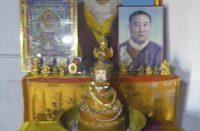
High Peaks Pure Earth presents a guest post, a review of Pema Tseden’s most recent fillm “Tharlo” written by Tibetan scholar Tsering Shakya.
Last year, High Peaks Pure Earth published translations of articles written about “Tharlo” in anticipation of its release. “Tharlo” had its international premiere at the Venice International Film Festival in 2015 and has since gone on to win awards at festivals all over the world. “Tharlo” will have its UK premiere in London on May 17 at the Chinese Visual Festival and will go on to be screened at the Sydney Film Festival in June.
Read an interview with Pema Tseden published in The Brooklyn Rail earlier this year. Thank you to Tsering Shakya for this review. To read another review by Tsering Shakya of Pema Tseden’s earlier film “Old Dog”, see Phayul.Com.
“The One Who Escaped”
A Review of Pema Tseden’s Film ‘Tharlo’ By Tsering Shakya
Pema Tseden’s new film Tharlo returns to his earlier theme of people living at the edge of China’s spectacular economic rise. The film is grounded in daily existence and in the lived experiences of the main protagonist, Tharlo. His name is one traditionally given to a child when the parents wish it to be their last, a sort of a wishful alternative to a contraceptive, and it can also be read as meaning “the end.” In Tibetan, Pema Tseden spells the name as thar lo, instead of the usual mthar, giving a new meaning: the one who escaped. In some ways, this is a fitting name, where the protagonist living in isolation has so far managed to evade being inscribed with an identity card. Whether or not the director is using the name here with some metaphorical implication, the film is certainly about the ending of the world that Tharlo knows and lives in. Tharlo himself prefers to go by the nickname it is used by others to describe his appearance, Ponytail, a fact that becomes a central part of the story.
The film is essentially a character study. The part of Tharlo is played by the well-known Tibetan comedian and actor-writer, Shide Nyima, but, as in his earlier films, Tseden uses non-professionals for the other characters, bringing a realistic, natural ambience to the film. Shide Nyima’s portrayal of the central character, with his distinctive physical traits and mannerisms, provides a solid basis for the film’s central theme of innocence seduced and of a person inserted into an alien environment. The hints of Tharlo’s slight but evident discomfort as he enters each new situation in the town avoids the stereotype of a country bumpkin lost in modernity and instead draws the audience into empathy and understanding.
The film begins with Tharlo reciting from memory “Serve the People”, a famous speech given by Mao Zedong at the memorial of the loyal soldier Chang Szu-teh (Zhang Side) in 1944. Tharlo is in the local police station, and his audience is the police chief of the town. The speech, we learn, has led Tharlo to weigh up the significance of his own life and has brought him to the conclusion that, given his limited education, he can only serve the people by continuing his work, which is herding the sheep of other villagers. For him, an orphan without the support of any family, shepherding is more than a livelihood: it is also a way to serve the community, since the sheep are not his own. We see that he has an intimate knowledge of his flock and cares for them diligently; he walks around the town with an orphaned lamb in his satchel, which he feeds from a baby’s bottle whenever it is thirsty.
The script is based on a short story written by the director in 2013, (published in literary journal Qinghai), in which the function of the other characters is to tell the story of Tharlo’s solitary life. He remains the focus throughout the film, at the centre of each scene. The film is shot in black and white, bringing a foreboding atmosphere to the screen, as if each frame were the photographic record of an incident. The lack of colour brings a sharp focus to the bleakness of the landscape, where economic development has blotted the Tibetan plateau with clusters of habitation that are neither fully urban nor rural. One senses a liminal space awaiting its “development”.
In the monochrome starkness of the cinematography, Tharlo’s puzzled and dazed countenance recalls archival documentation, offering a record of Tharlo’s world that, unknown to him, is crumbling before him, sheared of its innocence and encumbered with reality of encroachment that he cannot fully comprehend. He leads a solitary life in his shepherd encampment in the hills remote from the villages and the town into which he has rarely ventured. Unfamiliar with the rapid changes taking place around him, he tells the female protagonist Yangtso, played by Yangshig Tso, that he has never before encountered a Tibetan girl who smokes and has short hair. Although Yangtso embodies the typical features found in stereotypes of wayward seduction and urban corruption – short hair, cigarette-smoking, and night clubbing – Pema Tseden does not let the figure turn into a caricature or a pastiche of wickedness.
The film revolves around Tharlo’s discovery of himself and the world outside. His solitary existence has been noted by the administration and he finds himself summoned to the local police station to make a new identity card, as required for every citizen. He doesn’t understand why he has to have one and at the police station asks why such a thing is needed. The police chief explains that it is so that others will know who he is. Tharlo is puzzled: “I know who I am. Isn’t this enough?”
When Tharlo is sent down the street to be photographed for the identity card, his dishevelled appearance leads to him being sent to visit a hair salon, where he meets Yangtso. She tells him of her dreams of riches and travel, and of her hope for a rugged man with a ponytail to come and whisk her away to a better life. After she insists on taking him to a karaoke bar, Tharlo returns to the police station and informs the police chief that he thinks, but is not sure, that he has just met a “bad” person. “How can you tell if a person is a bad?” he asks the police chief. Much as the administration has discovered Tharlo, so he too is discovering the world that he has managed to avoid for so long. This process of discovery is not one marked by mutuality or a will to learn, but one of intrusion and inscription, a world in which what is once seen cannot again be made unseen.
The conflict that lies within the forces of attraction and seduction is a theme that has dominated Pema Tseden’s earlier films and his short stories, and in this respect his films are among the best commentaries so far produced on current development in Tibetan areas in China, away from the international media headlines and the rosy pictures offered by official media and the tourism industry. Instead, his films are studies of lived experience and of individuals grappling with transition and encroachment: he is at his best when he deals with the subject with which he is intimate, the rural poor and life at the edge of contemporary development. In Tharlo’s discovery of the unavoidable loss of solitude and innocence, signified throughout the film by changes in his appearance, we are shown a man confronted with a new and unyielding reality, one in which he learns that the possession of an ID card may leave him uncertain of who he is. The film does not present an optimistic depiction of life for those at the margins of China’s economic rise. Neither a story with a happy resolution or a narrative about political upheaval, it is a record of the concealed, inner turbulence that is reshaping the life of the dispossessed as they try to grapple with social and economic transformation.





I have understood མཐར་་ as past tense of ཐར་. with the same meaning: liberated or escape. If it is a name given in the Amdo region to signify end of having any more babies, the spelling shouldn’t matter as they arrive at the same meaning. The writer ignores however the second syllable ལོ་ meaning ‘year’ and assigns the meaning ‘The one who escaped’ to fit his narrative. In central Tibet, names like Thakchod and Tsamchod signfy the end to having more babies. Tharlo, if it indeed means that, it should be translated as the ‘year of liberation’ from giving birth.